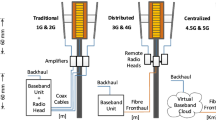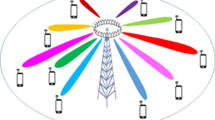Abstract
This paper, presents evaluation and analysis of the performance for multiple-input multiple-output (MIMO) schemes in the 3GPP long term evolution (LTE) system. Three performance metrics are considered for the analysis and evaluation, namely, average BER, average channel capacity and average throughput of the system for two different MIMO schemes as defined in LTE. Using the numerical results obtained from the mathematical expressions derived in the paper, we compare the presented schemes and show their significant advantages. Monte-Carlo simulation results of the LTE system are also provided to verify the accuracy of the mathematical analysis. The results for the average throughput of the considered MIMO schemes in LTE are presented for the un-coded case as well as for the coded-case in practical LTE scenarios. In addition, for the sake of comparison, the theoretical capacity limit of the system is also shown.








Similar content being viewed by others
References
Mehlführer, C., Wrulich, M., Ikuno, J. C., Bosanska, D., & Rupp, M. (2009). Simulating the long term evolution physical layer. In Proceedings of the European signal processing conference (EUSIPCO 2009).
Online, LTE link level simulator, 2009, Available http://www.nt.tuwien.ac.at/ltesimulator
Ikuno, J., Wrulich, M., & Rupp, M. (2010). System level simulation of LTE networks. In Proceedings of the IEEE vehicular echnology conference (VTC 2010-Spring) (pp. 1–5).
Simko, M., Mehlfuhrer, C., Wrulich, M., & Rupp, M. (2010). Doubly dispersive channel estimation with scalable complexity. In Proceedings of the international ITG workshop on smart antennas (WSA) (pp. 251–256).
Schwarz, S., Wrulich, M., & Rupp, M. (2010). Mutual information based calculation of the precoding matrix indicator for 3GPP UMTS/LTE. In 2010 International ITG workshop on smart antennas (WSA) (pp. 52–58).
Schwarz, S., Mehlfuhrer, C., & Rupp, M. (2010). Calculation of the spatial preprocessing and link adaption feedback for 3GPP UMTS/LTE. In Proceedings of the 6th conference on wireless advanced (WiAD) (pp. 1–6).
Alouini, M.-S., & Goldsmith, A. J. (2000). Adaptive modulation over Nakagami fading channels. Wireless Personal Communications, 13(1), 119–143.
Torabi, M., Jemmali, A., & Conan, J. (2014). Analysis of the performance for SFBC-OFDM and FSTD-OFDM schemes in LTE systems over MIMO fading channels. International Journal on Advances in Networks and Services, 7(1 and 2), 1–11.
Jemmali, A. (2013). Performance evaluation and analysis of MIMO schemes in LTE networks environment. PhD Thesis, Université de Montréal, École Polytechnique de Montréal, Quebec, Canada.
Tse, D., & Viswanath, P. (2008). Fundamentals of wireless communications. Cambridge, MA: Cambridge University Press.
Sesia, S., Issam, T., & Backer, M. (2011). LTE the UMTS long term evolution from theory to practice. New York: Wiley.
Torabi, M., Aissa, S., & Soleymani, M. (2007). On the BER performance of space-frequency block coded OFDM systems in fading MIMO channels. IEEE Transactions on Wireless Communications, 6(4), 1366–1373.
Alamouti, S. (1998). A simple transmit diversity technique for wireless communications. IEEE Journal on Selected Areas in Communications, 16(8), 1451–1458.
Torabi, M., & Haccoun, D. (2011). Performance analysis of joint user scheduling and antenna selection over MIMO fading channels. IEEE Signal Processing Letters, 18(4), 235–238.
Simon, M. K., & Alouini, M.-S. (1998). A unified approach to the performance analysis of digital communication over generalized fading channels. Proceedings of the IEEE, 86(9), 1860–1877.
Alouini, M. S., & Simon, M. K. (2000). Digital communications over fading channels: A unified approach to performance analysis. New York: Wiley.
Shannon, C. E. (1948). A mathematical theory of communication. The Bell System Technical Journal, 27, 379–423, 623–656, [Online]. Available: http://cm.bell-labs.com/cm/ms/what/shannonday/shannon1948.pdf
Telatar, I. E. (1999). Capacity of multi-antenna Gaussian channels. European Transactions on Telecommunications, 10, 585–595.
Torabi, M., Haccoun, D., & Ajib, W. (2010). Performance analysis of scheduling schemes for rate-adaptive MIMO OSFBC-OFDM systems. IEEE Transactions on Vehicular Technology, 59(5), 2363–2379.
Hanzo, L., Wong, C. H., & Yee, M. S. (2002). Adaptive wireless transceivers: Turbo-coded, turbo-equalised and space-time coded TDMA, CDMA and OFDM systems. New York: Wiley.
Günther, C. G. (1996). Comment on estimate of channel capacity in Rayleigh fading environment. IEEE Transactions on Vehicular Technology, 45(2), 401–403.
3GPP, Technical specification group radio access network, 2013, http://www.3gpp.org
Acknowledgments
This research has been performed in the department of Electrical Engineering, École Polytechnique de Montréal, QC, Canada.
Author information
Authors and Affiliations
Corresponding author
Rights and permissions
About this article
Cite this article
Jemmali, A., Torabi, M. & Conan, J. Performance Analysis of MIMO Schemes in 3GPP Long Term Evolution System. Wireless Pers Commun 82, 1107–1125 (2015). https://doi.org/10.1007/s11277-014-2269-y
Published:
Issue Date:
DOI: https://doi.org/10.1007/s11277-014-2269-y




